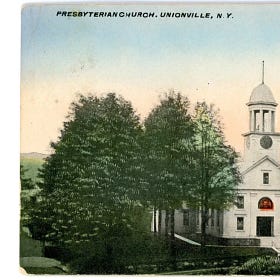To Machen the Law, the Gospel, and the church were too important to compromise, thus he could not countenance making them national, social, ethical, or pragmatically ecumenical.
There are certain things which you cannot expect from such a true Christian Church. In the first place, you cannot expect from it any cooperation with non-Christian religion or with a non-Christian program of ethical culture. There are those who tell us that the Bible ought to be put into the public schools, and that the public schools should seek to build character by showing the children that honesty is the best policy and that good Americans do not lie nor steal. With such programs a true Christian Church will have nothing to do. The Bible, (a true Christian Church) will hold, is made to say the direct opposite of what it means if any hope is held out to mankind from its ethical portions apart from its great redemptive center and core; and character building on the basis of human experience may be character destruction; it is the very antithesis of that view of sin which is at the foundation of all Christian convictions and all Christian life.
This was an unpopular position in 1935 and is still unpopular today. Some today hold that “Cultural Christianity is enough” to transform society. Machen lived amidst cultural Christianity and saw that it was not and could never be enough. He had seen the social gospel, the “American gospel,” and the moralist gospel—he was not having any of them. He believed that making Christianity first (or equally—intentionally or not) about moral teaching and moral improvement made it another religion altogether. This fatal error was endemic to Protestant liberalism and then (as now) there was a right-wing/conservative version of the error, too.
There is no such thing, a true Christian Church will insist, as a universally valid fund of religious principles upon which particular religions, including the Christian religion, may build; “religion” in that vague sense is not only inadequate but false; and a morality based upon human experience instead of upon the law of God is no true morality. Against such programs of religious education and character building, a true Christian Church will seek from the state liberty for all parents everywhere to bring up their children in accordance with the dictates of their conscience, will bring up its own children in accordance with the Word of God, and will try to persuade all other parents, becoming Christians, to bring up their children in that same Christian way.
Machen was for liberty of conscience, worship, and belief rather than compulsion, whether formal or de facto, federal or local. Machen was no “Christian nationalist”—he was living and ministering in a “Christian nation” that had lost the gospel.
Read The Responsibility of the Church in Our New Age in full.
Listen to a fine reading of the article (39 minutes) by Bob Tarullo.
Stay tuned for future/final installments - by Brad Isbell
READ PART 12:
Otherworldy Ethics in This World
Machen was surrounded by academics, politicians, and even church leaders who viewed the church as a means to an ethical, practical, societal end. But the ethics Machen had in mind were radical because they were first oriented vertically (rather exclusively horizontally) and pointed first to another world…not this one.



